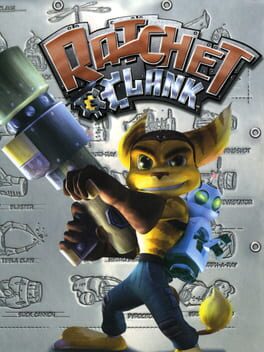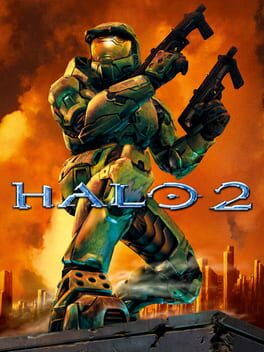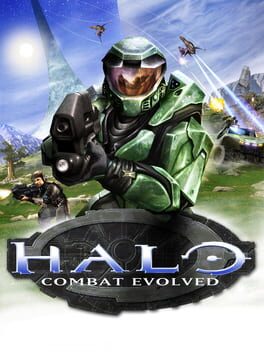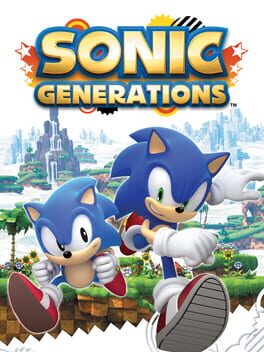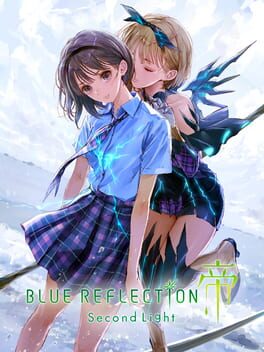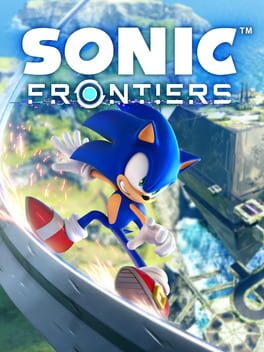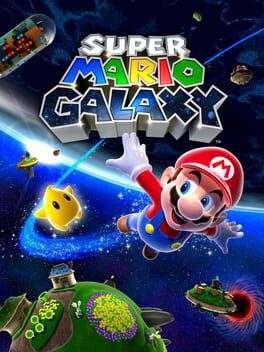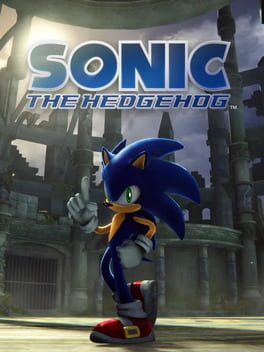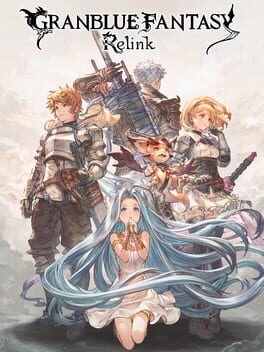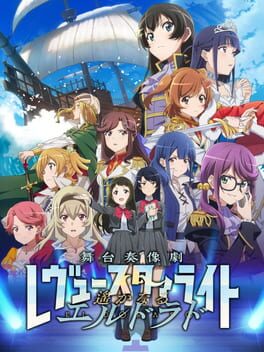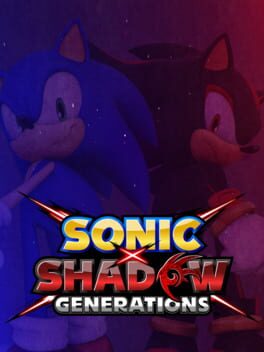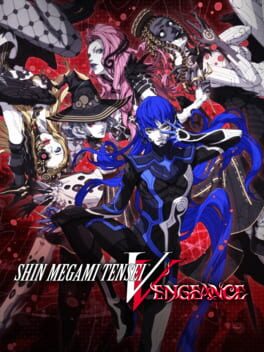blu3fl0w
20 reviews liked by blu3fl0w
Ratchet & Clank
2002
Maybe this is just my perspective as a Nintendo child speaking, but the games catalogue of Insomniac Games always fascinated me from a distance for how...underdiscussed their games seemed to be, despite being regarded as classics. There's absolutely a vocal fanbase for Spyro, and an even more vocal fanbase for their later hit series, yet it was never quite one I was able to get a grasp on the consensus of - there was an understood agreement of quality yet never one true point to really anchor it down. And I hate to be part of the problem, but now with first-hand experience under my belt, I think I get what they mean: The original Ratchet & Clank manages to be a great game despite never truly excelling in any one area of design.
I try, with any game I play, to understand the objective and intent of the designers and artists behind the game during my time playing it - to reach a sort of agreement upon which to draw my analysis. This is part of why platformers are some of my all-time favorite games - their intent is usually immediately understandable as soon as you're given control. Mario is a toybox - games with a character able to do many things, with levels often made purely around the lowest common denominator, yet with a moveset sparkling with potential for freedom of expression. Sonic is a training ground - a set of mechanics that oft feel unwiedly and difficult to use properly, yet one with boundless potential for faster, yet faster times, with a ranking system always at the ready to push you to your absolute limits. Donkey Kong and Crash are an obstacle course - characters with dead-simple mechanics placed in contexts that ask the utmost of your capabilities as a player, of your mastery of every little interaction between the character and their world, with bountiful rewards given to those who can go the extra mile. Yet in my time demoing the original Spyro the Dragon, this sort of distillation felt damn near impossible to get done. Spyro could move fast, yet his levels lacked incentive to utilize it to its fullest. He could breathe fire, jump and glide, yet there's rarely more asked of you to do than those basic actions in isolation. And as I was playing, trying to think of yet one more think to note down...the level I was in had already ended.
And that's when it clicked for me - the secret ingredient.
The absolute greatest achievement of Ratchet & Clank, beyond its distinct art design, immaculate music, charming character writing and thematic core, is that a fast, steady pace is prioritized above all else. Ratchet & Clank, much like its dragonic ancenstor, doesn't truly push the envelope in any one particular area of its gameplay - its gunplay is simple, its jumps and platforming are not much more than fit-for-purpose, and its mobility is never one to truly let the player run freely about. Yet none of what Ratchet & Clank tasks its players with accomplishing ever takes long enough to where one would begin longing for more. Enemies can be defeated as quickly as they appear, and their deaths are punctuated with the oh-so-satisfying sounds of bolts - hard cash in the Ratchetverse - whizzing into the lombax's pockets. Atop every hill lays a new visually distinct, breathtaking vista - and after just four or five of those, you've circled back to your ship, seen a funny cutscene with entertaining dialogue, and gotten a new weapon or mobility upgrade. Particularly with the weapons, there's always something to draw your attention - "maybe I could try the Visibomb here?" "These enemies are all bunched together, maybe the Walloper would be funny to use here?" "Ooh, if I use the Mine Glove and then Taunter, I can draw enemies into the mines!" It's not so much that these creative options for combat are required nor rewarding to solve, but that it all adds to the feeling of the game always having stimulus of some sort at the ready.
It's easy to liken its constant sense of progression to a Metroidvania or RPG, but it althesame feels immensely befitting of the narrative the original Ratchet & Clank tells. The duo are an odd pair in this one, going from somewhat neutral on one another to bickering to becoming more genuinely trusting of one another, yet the everpresent constant that drives the dynamic is Ratchet's own hot-headedness, not in any way moronic yet always leading thoughts with the trigger rather than the brain. The easy comparison to make here would be toward Sonic the Hedgehog, yet for as much of a go-getter as he is, I've always had the impression that he's fully capable and willing to slow down and assess situations inbetween sprints: he's never been restrained in his life and knows when its okay to take it slow. Ratchet, meanwhile, is excited to finally be off his home, finally getting to see the world and let it guide his ship on his first real adventure - he never stops to chat or befriend anyone for longer than what's needed. It feels like a reflection of the game's own pace and structure, as if the environments we explore aren't necessarily seen in their entirety, but only in the pieces that Ratchet himself is willing to go through before being ready to hop off to the next fun world. The persona of a determined delinquent scrapyard mechanic also obviously lends itself further to the combat, as it never stops feeling exciting to mow down fools with the arsenal at your disposal.
If Ratchet is emblematic of the sheer sense of tempo, aggression and power given to the player throughout the game, then I suppose Clank represents the opposite aspects - the details that are easily missed, almost asking one to slow down to be fully appreciated. The absolute scale, atmosphere and visual detail of a world like Metropolis, the effects and animations of every gun and enemy, the differing architecture and sense of culture from planet to planet...though its a world that you can easily and quite enjoyably breeze through, its also one that doesn't shy away from letting the player smell the roses at their own leisure. I feel like this balance seeps into upholding just about every part of the game - the cutscenes are both funny because of the snappy and outright excellent dialogue, yet watching attentively can alert the player to so many little intricacies of how the universe and its people operate. How much a character like Captain Qwark says about the status, importance and exploitation of celebrities, how full-scale warfare sort of just happens in the background in several of the game's planets without any true sense of panic or surprise expressed by its inhabitants - as if its just part of their everyday lives to expect the world to turn upside down at the whims of their rulers. And crucially how, despite being a mechanic and a rebel in spirit, Ratchet remains subservient to a capitalist system - his collected scrap isn't material to craft weapons on his own accord, but currency for purchasing weapons as goods. Like your average punk-rock song, Ratchet & Clank knows, criticizes and shouts about the system that's restraining them, yet relishes in that rebelliousness as an aesthetic moreso than committing to serious discussion on the topics raised. It has important things to say and messages to be dissected by its players, yet the aforementioned Ratchet half of the game sees to ensures that such discussion never bogs down the game's pure intentions of being a fun video game for too long - what fun is punk-rock if you can't enjoy listening to it?
Put rather bluntly, Ratchet & Clank can often feel like a game of many half-measures: much like Spyro its influences are clear to see yet its commitment lays uncertain. Yet all of it is wrapped in an aesthetic, structure and pace that sparks of confidence, a pair of voices shouting at you to always keep going fast yet to also always appreciate the detail and care of the world. And though there are times where those two voices feel thoroughly at odds with one another, for a surprising amount of the runtime they truly do harmonize into an experience that kept me hooked.
Though I may not love Ratchet & Clank, the game feels as if it is truly in love with itself, and I can't help but find that admirable.
[Playtime: 14 Hours]
[Key Word: Rapidfire]
I try, with any game I play, to understand the objective and intent of the designers and artists behind the game during my time playing it - to reach a sort of agreement upon which to draw my analysis. This is part of why platformers are some of my all-time favorite games - their intent is usually immediately understandable as soon as you're given control. Mario is a toybox - games with a character able to do many things, with levels often made purely around the lowest common denominator, yet with a moveset sparkling with potential for freedom of expression. Sonic is a training ground - a set of mechanics that oft feel unwiedly and difficult to use properly, yet one with boundless potential for faster, yet faster times, with a ranking system always at the ready to push you to your absolute limits. Donkey Kong and Crash are an obstacle course - characters with dead-simple mechanics placed in contexts that ask the utmost of your capabilities as a player, of your mastery of every little interaction between the character and their world, with bountiful rewards given to those who can go the extra mile. Yet in my time demoing the original Spyro the Dragon, this sort of distillation felt damn near impossible to get done. Spyro could move fast, yet his levels lacked incentive to utilize it to its fullest. He could breathe fire, jump and glide, yet there's rarely more asked of you to do than those basic actions in isolation. And as I was playing, trying to think of yet one more think to note down...the level I was in had already ended.
And that's when it clicked for me - the secret ingredient.
The absolute greatest achievement of Ratchet & Clank, beyond its distinct art design, immaculate music, charming character writing and thematic core, is that a fast, steady pace is prioritized above all else. Ratchet & Clank, much like its dragonic ancenstor, doesn't truly push the envelope in any one particular area of its gameplay - its gunplay is simple, its jumps and platforming are not much more than fit-for-purpose, and its mobility is never one to truly let the player run freely about. Yet none of what Ratchet & Clank tasks its players with accomplishing ever takes long enough to where one would begin longing for more. Enemies can be defeated as quickly as they appear, and their deaths are punctuated with the oh-so-satisfying sounds of bolts - hard cash in the Ratchetverse - whizzing into the lombax's pockets. Atop every hill lays a new visually distinct, breathtaking vista - and after just four or five of those, you've circled back to your ship, seen a funny cutscene with entertaining dialogue, and gotten a new weapon or mobility upgrade. Particularly with the weapons, there's always something to draw your attention - "maybe I could try the Visibomb here?" "These enemies are all bunched together, maybe the Walloper would be funny to use here?" "Ooh, if I use the Mine Glove and then Taunter, I can draw enemies into the mines!" It's not so much that these creative options for combat are required nor rewarding to solve, but that it all adds to the feeling of the game always having stimulus of some sort at the ready.
It's easy to liken its constant sense of progression to a Metroidvania or RPG, but it althesame feels immensely befitting of the narrative the original Ratchet & Clank tells. The duo are an odd pair in this one, going from somewhat neutral on one another to bickering to becoming more genuinely trusting of one another, yet the everpresent constant that drives the dynamic is Ratchet's own hot-headedness, not in any way moronic yet always leading thoughts with the trigger rather than the brain. The easy comparison to make here would be toward Sonic the Hedgehog, yet for as much of a go-getter as he is, I've always had the impression that he's fully capable and willing to slow down and assess situations inbetween sprints: he's never been restrained in his life and knows when its okay to take it slow. Ratchet, meanwhile, is excited to finally be off his home, finally getting to see the world and let it guide his ship on his first real adventure - he never stops to chat or befriend anyone for longer than what's needed. It feels like a reflection of the game's own pace and structure, as if the environments we explore aren't necessarily seen in their entirety, but only in the pieces that Ratchet himself is willing to go through before being ready to hop off to the next fun world. The persona of a determined delinquent scrapyard mechanic also obviously lends itself further to the combat, as it never stops feeling exciting to mow down fools with the arsenal at your disposal.
If Ratchet is emblematic of the sheer sense of tempo, aggression and power given to the player throughout the game, then I suppose Clank represents the opposite aspects - the details that are easily missed, almost asking one to slow down to be fully appreciated. The absolute scale, atmosphere and visual detail of a world like Metropolis, the effects and animations of every gun and enemy, the differing architecture and sense of culture from planet to planet...though its a world that you can easily and quite enjoyably breeze through, its also one that doesn't shy away from letting the player smell the roses at their own leisure. I feel like this balance seeps into upholding just about every part of the game - the cutscenes are both funny because of the snappy and outright excellent dialogue, yet watching attentively can alert the player to so many little intricacies of how the universe and its people operate. How much a character like Captain Qwark says about the status, importance and exploitation of celebrities, how full-scale warfare sort of just happens in the background in several of the game's planets without any true sense of panic or surprise expressed by its inhabitants - as if its just part of their everyday lives to expect the world to turn upside down at the whims of their rulers. And crucially how, despite being a mechanic and a rebel in spirit, Ratchet remains subservient to a capitalist system - his collected scrap isn't material to craft weapons on his own accord, but currency for purchasing weapons as goods. Like your average punk-rock song, Ratchet & Clank knows, criticizes and shouts about the system that's restraining them, yet relishes in that rebelliousness as an aesthetic moreso than committing to serious discussion on the topics raised. It has important things to say and messages to be dissected by its players, yet the aforementioned Ratchet half of the game sees to ensures that such discussion never bogs down the game's pure intentions of being a fun video game for too long - what fun is punk-rock if you can't enjoy listening to it?
Put rather bluntly, Ratchet & Clank can often feel like a game of many half-measures: much like Spyro its influences are clear to see yet its commitment lays uncertain. Yet all of it is wrapped in an aesthetic, structure and pace that sparks of confidence, a pair of voices shouting at you to always keep going fast yet to also always appreciate the detail and care of the world. And though there are times where those two voices feel thoroughly at odds with one another, for a surprising amount of the runtime they truly do harmonize into an experience that kept me hooked.
Though I may not love Ratchet & Clank, the game feels as if it is truly in love with itself, and I can't help but find that admirable.
[Playtime: 14 Hours]
[Key Word: Rapidfire]
Halo 2
2004
Halo: Combat Evolved
2001
As a result of me writing off fps games when I was younger and having parents who would've NEVER let me play a game like this before my teens, I never grew up with Halo.
With my first experience with the series being as an adult a lot of this games' flaws were very apparent. The second half just kinda shits itself with the amount of assets reused combined with how much it spams flood in the last four levels.
Despite that however I had a lot of fun going through the campaign and there is undeniably a lot to appreciate in what it achieves graphically and narratively. There are moments like stepping out of the ship in Mission 2 and the final vehicle sequence in Mission 10 that stick with you just for how cool they are.
While far from a favorite, it's not hard to see why this is still looked back on fondly as a classic two decades later.
With my first experience with the series being as an adult a lot of this games' flaws were very apparent. The second half just kinda shits itself with the amount of assets reused combined with how much it spams flood in the last four levels.
Despite that however I had a lot of fun going through the campaign and there is undeniably a lot to appreciate in what it achieves graphically and narratively. There are moments like stepping out of the ship in Mission 2 and the final vehicle sequence in Mission 10 that stick with you just for how cool they are.
While far from a favorite, it's not hard to see why this is still looked back on fondly as a classic two decades later.
Sonic Generations
2011
There’s a very short sequence in the endgame of Sonic Generations that takes place right before the final boss. You platform across a series of clocks that start to move as the chaos emeralds are placed in each one. It’s not anywhere close as bombastic or detailed as any of the levels in the game, but this sequence was something that always stood out to eight year old me. The weary and rustic look of each of the clocks, the different ways the platforms turn around, the backing noise that’s usually shortened versions of music from the stages being replaced by the sound of ticking clocks. The ambience of the scene mesmerized me in a way that I hadn’t been before. It’s a small instance that’s likely to be forgotten by most players, but I feel that it changed the way I viewed this vast white void to some degree. As I went about completing each of the missions, I noticed the ways that certain aspects of the stage exteriors that had been consumed by stark emptiness had become more lively with each success I have with progression. Seeing these locations come to life outside of when I’m blazing past them. Once all the missions were complete, exploring the hub world and seeing color brought to every corner of it was a subtle but strangely beautiful experience. I feel that this experience was a sort of catalyst for my love of environments in games, what made me want to explore and see what makes these various virtual worlds tick. And to think that this passion came from an empty white void. I suppose it does speak to how you can find your passion for things in the most unlikely places.
Sonic Frontiers
2022
Third time's the charm, gamers. Now that I've properly beaten Sonic Frontiers - if only to justify the disgusting amount of money I paid for this game; I'd forgotten just how much $60 actually is - I think I have some more legitimate grounds to review this game on than a spite-fueled (but justified and honestly based) diatribe / retrospective on over twenty years of on-and-off disappointment at the hands of Sonic Team and their inconsistent little media darling. And guess what? I actually dislike the game even more now that the initial, impulsive surge of anger and disappointment has passed. I didn't just spend $60 on a bad game, I spent $60 on a soulless game masquerading as something soulful. It's so fucking bad, but it's bad in an... interesting and thought-provoking way compared to Sonic Forces' absolute nothingness.
Whereas Forces didn't even bother pretending that it had a heart of any kind, Frontiers actively plays a smoke-and-mirrors game with the player, cleverly waving its' superficially stimulating elements in front of your face like a thick helping of wool right over your eyes. Look! Open world! Ian Flynn! Hype boss battles! A cryptic and mysterious trailer! All of these things, dangled in front of the consumer like jangling, shiny keys, made Frontiers very initially compelling. People were finally interested in a Sonic game for the first time in a long time, and these surface-level elements added just enough intrigue to keep its' oft-battered fanbase hooked. After all, when you're a Sonic fan, you'll take anything other than table scraps if it means you might get a decent experience this time. Something is better than absolutely nothing, right? Even if it winds up being next to nothing?
All these promising, eye-catching elements wound up amounting to absolutely nothing all that special. Like... yeah, sure, there's an open world. An empty, barren, lifeless open world that regrettably - but predictably - prioritizes size & scope over substance. Sure, Ian Flynn's in charge of writing (supposedly), but the shockingly underwhelming and undercooked writing is simply not up to snuff this time around, not even close to the intricate, playful dialogue & characters he gave us in both the Archie & IDW universes. Sure, the boss battles have these screaming edgelord metal tracks in the background led by the Sleeping With Sirens guy of all people (Sonic is still relevant!!!!), but they're also a painfully easy collection of convoluted, on-rails button-mashers at best and a jarring, ill-fitting cluster of quick-time events at worst.
And honestly, for me, all of that intrigue and mystery that was hyped up by the trailers wound up going absolutely nowhere. The Starfall Islands wind up feeling like a less-effective rehash of all the Echinda Lore that Ian Flynn is no doubt very intimately familiar with: a once-powerful tribe that tries to harness the Chaos Emeralds and then get destroyed by a more powerful being... like, shit, stop me if that sounds familiar. (The ancient Kocos even look like Chaos in flashbacks!) Sonic and his friends don't interact with the lore or the world around them in any meaningful way beyond how it only faintly relates to them, in a way that makes them feel kinda selfish.
Amy witnesses this surprisingly tender, nonverbal scene of love between two Ancient Kocos in the middle of a terrible war (one of the only effective scenes in the whole game), and decides that she wants to spread love throughout the world. As if that's... different from what she was basically already doing? Tails decides that he's tired of following in Sonic's silhouette after witnessing a similar situation with an eager, young Koco, as if they didn't already have this exact arc more than twenty years ago in Sonic Adventure 1. The one exception to the rule is Knuckles, who does at least acknowledge that the islanders' situation is remarkably similar to his own people's... before virtually never bringing it up again after that singular scene. So when the lore isn't a vaguely-boring reprise of the Echidna stuff from the games and comics, the plot rapid-fire rushes its paper-thin characters through "character arcs" in scenes where they're like "I want to change in a way that doesn't actually change who I am" or "I've decided to rehash the same arc I literally already went through" and Sonic replies with a steadfast "mmk" each and every time.
The only genuinely intriguing throughline of the entire plot is the 'corruption' thing that happens to Sonic over the course of the game. Initially, I was liking how the story was only quietly addressing what was happening to him, and I thought the buildup to Sonic's full-on corruption was actually pretty great... until it got resolved in a single scene where the power of friendship randomly cures Sonic of the thing that had been ailing him throughout the entire plot. How... convenient.
In a depressing twist of fate, Eggman can't even salvage this plot. You could honestly write Eggman out of the plot entirely; he spends all of his time dicking around in the painfully-underexplored Cyber Space and just looking for a way out instead of doing anything of any merit. I'm honestly not sure why they even bothered, especially given that the one relevant thing about him in the entire story - the relationship between him and Sage - is, once again, pretty undercooked and underdeveloped in the grand scheme of things. Sage herself is... fine, I guess? A for effort. Her character growth is passable, if completely predictable, and the plot pulls a classic "she dies at the end but doesn't actually die" rabbit out of its hat as if that would impress anyone at all.
See, I've been using a lot of magic and illusory terms throughout this review - rabbit in a hat, smoke and mirrors, wool over eyes - because I think that sums up Frontiers perfectly. It pretends to have soul by borrowing elements from the games that people like. A plot and cast remarkably similar to Sonic Adventure 1, complete with a Big the Cat cameo? Check. Poorly-implemented 2D-3D hybrid sections similar to Sonic Generations, the only Boost Formula game that hasn't come under any particular flak? Check. A painful overreliance on Green Hill, Chemical Plant, and Sky Sanctuary, because obviously fans haven't gotten sick of seeing these exact same locales ad infinitum ad nauseum? Check. I even noticed a handful of Cyber Space levels that copied the level composition of Green Forest and Sky Rail from SA2. They went beyond copying the look of those stages and went as far as to just recreate the exact same levels (I believe it was 3-1 and 2-6 respectively). This is the trick the game pulls on the average player. It presents the illusion of depth without the commitment by either borrowing from games that people like (be it popular Sonic games or Breath of the Wild / Nier: Automata) or presenting bold-sounding ideas that would look great in a review blurb. (Open world!!!!!!!!!)
But it's all so... nothing. All of these discrete, separate ingredients half-heartedly combine together to make a frustratingly bland and shallow dish. Everything feels hollow. Combat is a trivial, button-mashing affair that only deserves credit for the fact that it's sliiiightly better than "boost to win". Running feels awful until you level it up to a properly 'fast' amount (having to level up your top speed feels like the punchline to a bad Sonic joke), and even then, there's no sense of momentum or weight to your actions whatsoever. The open world is a cluttered disaster of banal, samey-feeling activities with rails, springs, and random platforms placed so haphazardly and sloppily around the world that it starts feeling like a randomly-generated Forge / Unity map. And the amount of padding Frontiers managed to cram into its runtime is utterly nightmarish. Frontiers is secretly a four-hour game that painfully, laboriously stretches itself out to twelve-fifteen through the tried-and-true Ubisoft method of making you collect shit.
That's right, collect-a-thon fetch quests, everyone's favorite thing about Sonic. Just look at how much people liked the fetch quests in Shadow, or the medals in Unleashed! But Frontiers actually takes it three steps further than its' much-maligned predecessor by asking you to collect an absolutely insane amount of Tokens and artificially withholding the plot from you until you collect these Tokens. There are moments where you deadass cannot progress the story unless you cave in and Collect All The Things, and sometimes your reward for doing so is just a fucking cutscene that basically tells you to keep collecting. At the climax of the game you're expected to collect like over 200 of these fuckers, and lemme tell you, were it not for Big The Cat, I deadass think I would have been driven mad by sheer, unadulterated, tedium-induced boredom. The literal only reason I was able to complete this game in the (painfully long) twelve or so hours I spent playing it was thanks to the fishing minigame you can play with Big, an Animal Crossing-esque button prompt minigame where you can catch fish and then trade in the tokens you get from the fish for Plot Items, including the Tokens you desperately need to continue the story with. This cuts down on the grinding considerably, but it also just feels like a band-aid slapped onto the gaping wound that was the idea to make this game a collect-a-thon in the first place.
The funniest part about that fishing thing I just mentioned? It's unironically the best part of the game, and that's both incredibly sad and incredibly funny. There's something very... Zen about the fishing minigame. You just kick back and relax to easily the best song in the overloaded OST, press a couple buttons, and then smile or chuckle whenever Sonic catches a fish much larger than him or something silly like an alligator or an oversized tire. All of the frustration and tedium just melts away for a few minutes. I was honestly having more fun just relaxing and listening to some chill lo-fi music than I was playing the actual Sonic game I spent $60 for, and funnily enough, that's when it hit me that this game might be a 1 instead of a measly 1.5. I was actively - and repeatedly - playing this minigame in order to avoid having to play more of the janky collection of chores masquerading as a "game" that waited me outside of the peaceful, comforting rivers that Big calmly inhabits. Big makes it incredibly easy to just not engage with the rest of the game, and while I was frankly thankful for that, it also highlights just how trivial everything is. Who cares about exploring or unlocking other parts of the map when you can just put a marker down on the spots where Big is and just run back there whenever you need some Plot Tokens? It actually winds up being faster to do this since the game starts increasing the amount of Tokens you need over time while simultaneously giving you less and less them over time, a bullshit decision that artificially lengthens the game to infinity and dulled me into an upset, uncomfortable stupor.
In conclusion, this is why I'm honestly stunned that some people are so taken with Sonic Frontiers. I'm honestly wondering where all of the heart and soul that people seem to have found in this game actually... is. Frontiers is a boring, dead-eyed trot through an empty, unassuming world that cobbles together a blatantly-stolen BOTW-Genshin Impact aesthetic and a truly garish amount of reused assets/levels/fucking ideas along with capital-M Mandatory fetch quests and the usual game-breaking Sonic jank. When you aren't gormlessly running through a barren and colorless world marred with terrible pop-in and some alarmingly ugly assets just cluttering the skyline, you're making brief treks through old levels you've literally already played before or mindlessly collecting Things to make the artificially broken-up and thoroughly-unassuming Plot actually continue, like feeding coins into a soda machine so it gives you your fucking soda already. It's all so... lifeless, genuinely lacking the same color, zest, and enthusiasm that previous Sonic entries - even the bad ones - had in excess. Soullessness wearing the mask of something soulful. If you're enjoying this, then... good for you? But also, you don't need me or anyone else to hold your hand for you. Sometimes people will hate the shit you like, and sometimes, that's okay, because sometimes that shit is Sonic Frontiers. After five-plus years of waiting, this is what we were given.
So much for redemption.
Whereas Forces didn't even bother pretending that it had a heart of any kind, Frontiers actively plays a smoke-and-mirrors game with the player, cleverly waving its' superficially stimulating elements in front of your face like a thick helping of wool right over your eyes. Look! Open world! Ian Flynn! Hype boss battles! A cryptic and mysterious trailer! All of these things, dangled in front of the consumer like jangling, shiny keys, made Frontiers very initially compelling. People were finally interested in a Sonic game for the first time in a long time, and these surface-level elements added just enough intrigue to keep its' oft-battered fanbase hooked. After all, when you're a Sonic fan, you'll take anything other than table scraps if it means you might get a decent experience this time. Something is better than absolutely nothing, right? Even if it winds up being next to nothing?
All these promising, eye-catching elements wound up amounting to absolutely nothing all that special. Like... yeah, sure, there's an open world. An empty, barren, lifeless open world that regrettably - but predictably - prioritizes size & scope over substance. Sure, Ian Flynn's in charge of writing (supposedly), but the shockingly underwhelming and undercooked writing is simply not up to snuff this time around, not even close to the intricate, playful dialogue & characters he gave us in both the Archie & IDW universes. Sure, the boss battles have these screaming edgelord metal tracks in the background led by the Sleeping With Sirens guy of all people (Sonic is still relevant!!!!), but they're also a painfully easy collection of convoluted, on-rails button-mashers at best and a jarring, ill-fitting cluster of quick-time events at worst.
And honestly, for me, all of that intrigue and mystery that was hyped up by the trailers wound up going absolutely nowhere. The Starfall Islands wind up feeling like a less-effective rehash of all the Echinda Lore that Ian Flynn is no doubt very intimately familiar with: a once-powerful tribe that tries to harness the Chaos Emeralds and then get destroyed by a more powerful being... like, shit, stop me if that sounds familiar. (The ancient Kocos even look like Chaos in flashbacks!) Sonic and his friends don't interact with the lore or the world around them in any meaningful way beyond how it only faintly relates to them, in a way that makes them feel kinda selfish.
Amy witnesses this surprisingly tender, nonverbal scene of love between two Ancient Kocos in the middle of a terrible war (one of the only effective scenes in the whole game), and decides that she wants to spread love throughout the world. As if that's... different from what she was basically already doing? Tails decides that he's tired of following in Sonic's silhouette after witnessing a similar situation with an eager, young Koco, as if they didn't already have this exact arc more than twenty years ago in Sonic Adventure 1. The one exception to the rule is Knuckles, who does at least acknowledge that the islanders' situation is remarkably similar to his own people's... before virtually never bringing it up again after that singular scene. So when the lore isn't a vaguely-boring reprise of the Echidna stuff from the games and comics, the plot rapid-fire rushes its paper-thin characters through "character arcs" in scenes where they're like "I want to change in a way that doesn't actually change who I am" or "I've decided to rehash the same arc I literally already went through" and Sonic replies with a steadfast "mmk" each and every time.
The only genuinely intriguing throughline of the entire plot is the 'corruption' thing that happens to Sonic over the course of the game. Initially, I was liking how the story was only quietly addressing what was happening to him, and I thought the buildup to Sonic's full-on corruption was actually pretty great... until it got resolved in a single scene where the power of friendship randomly cures Sonic of the thing that had been ailing him throughout the entire plot. How... convenient.
In a depressing twist of fate, Eggman can't even salvage this plot. You could honestly write Eggman out of the plot entirely; he spends all of his time dicking around in the painfully-underexplored Cyber Space and just looking for a way out instead of doing anything of any merit. I'm honestly not sure why they even bothered, especially given that the one relevant thing about him in the entire story - the relationship between him and Sage - is, once again, pretty undercooked and underdeveloped in the grand scheme of things. Sage herself is... fine, I guess? A for effort. Her character growth is passable, if completely predictable, and the plot pulls a classic "she dies at the end but doesn't actually die" rabbit out of its hat as if that would impress anyone at all.
See, I've been using a lot of magic and illusory terms throughout this review - rabbit in a hat, smoke and mirrors, wool over eyes - because I think that sums up Frontiers perfectly. It pretends to have soul by borrowing elements from the games that people like. A plot and cast remarkably similar to Sonic Adventure 1, complete with a Big the Cat cameo? Check. Poorly-implemented 2D-3D hybrid sections similar to Sonic Generations, the only Boost Formula game that hasn't come under any particular flak? Check. A painful overreliance on Green Hill, Chemical Plant, and Sky Sanctuary, because obviously fans haven't gotten sick of seeing these exact same locales ad infinitum ad nauseum? Check. I even noticed a handful of Cyber Space levels that copied the level composition of Green Forest and Sky Rail from SA2. They went beyond copying the look of those stages and went as far as to just recreate the exact same levels (I believe it was 3-1 and 2-6 respectively). This is the trick the game pulls on the average player. It presents the illusion of depth without the commitment by either borrowing from games that people like (be it popular Sonic games or Breath of the Wild / Nier: Automata) or presenting bold-sounding ideas that would look great in a review blurb. (Open world!!!!!!!!!)
But it's all so... nothing. All of these discrete, separate ingredients half-heartedly combine together to make a frustratingly bland and shallow dish. Everything feels hollow. Combat is a trivial, button-mashing affair that only deserves credit for the fact that it's sliiiightly better than "boost to win". Running feels awful until you level it up to a properly 'fast' amount (having to level up your top speed feels like the punchline to a bad Sonic joke), and even then, there's no sense of momentum or weight to your actions whatsoever. The open world is a cluttered disaster of banal, samey-feeling activities with rails, springs, and random platforms placed so haphazardly and sloppily around the world that it starts feeling like a randomly-generated Forge / Unity map. And the amount of padding Frontiers managed to cram into its runtime is utterly nightmarish. Frontiers is secretly a four-hour game that painfully, laboriously stretches itself out to twelve-fifteen through the tried-and-true Ubisoft method of making you collect shit.
That's right, collect-a-thon fetch quests, everyone's favorite thing about Sonic. Just look at how much people liked the fetch quests in Shadow, or the medals in Unleashed! But Frontiers actually takes it three steps further than its' much-maligned predecessor by asking you to collect an absolutely insane amount of Tokens and artificially withholding the plot from you until you collect these Tokens. There are moments where you deadass cannot progress the story unless you cave in and Collect All The Things, and sometimes your reward for doing so is just a fucking cutscene that basically tells you to keep collecting. At the climax of the game you're expected to collect like over 200 of these fuckers, and lemme tell you, were it not for Big The Cat, I deadass think I would have been driven mad by sheer, unadulterated, tedium-induced boredom. The literal only reason I was able to complete this game in the (painfully long) twelve or so hours I spent playing it was thanks to the fishing minigame you can play with Big, an Animal Crossing-esque button prompt minigame where you can catch fish and then trade in the tokens you get from the fish for Plot Items, including the Tokens you desperately need to continue the story with. This cuts down on the grinding considerably, but it also just feels like a band-aid slapped onto the gaping wound that was the idea to make this game a collect-a-thon in the first place.
The funniest part about that fishing thing I just mentioned? It's unironically the best part of the game, and that's both incredibly sad and incredibly funny. There's something very... Zen about the fishing minigame. You just kick back and relax to easily the best song in the overloaded OST, press a couple buttons, and then smile or chuckle whenever Sonic catches a fish much larger than him or something silly like an alligator or an oversized tire. All of the frustration and tedium just melts away for a few minutes. I was honestly having more fun just relaxing and listening to some chill lo-fi music than I was playing the actual Sonic game I spent $60 for, and funnily enough, that's when it hit me that this game might be a 1 instead of a measly 1.5. I was actively - and repeatedly - playing this minigame in order to avoid having to play more of the janky collection of chores masquerading as a "game" that waited me outside of the peaceful, comforting rivers that Big calmly inhabits. Big makes it incredibly easy to just not engage with the rest of the game, and while I was frankly thankful for that, it also highlights just how trivial everything is. Who cares about exploring or unlocking other parts of the map when you can just put a marker down on the spots where Big is and just run back there whenever you need some Plot Tokens? It actually winds up being faster to do this since the game starts increasing the amount of Tokens you need over time while simultaneously giving you less and less them over time, a bullshit decision that artificially lengthens the game to infinity and dulled me into an upset, uncomfortable stupor.
In conclusion, this is why I'm honestly stunned that some people are so taken with Sonic Frontiers. I'm honestly wondering where all of the heart and soul that people seem to have found in this game actually... is. Frontiers is a boring, dead-eyed trot through an empty, unassuming world that cobbles together a blatantly-stolen BOTW-Genshin Impact aesthetic and a truly garish amount of reused assets/levels/fucking ideas along with capital-M Mandatory fetch quests and the usual game-breaking Sonic jank. When you aren't gormlessly running through a barren and colorless world marred with terrible pop-in and some alarmingly ugly assets just cluttering the skyline, you're making brief treks through old levels you've literally already played before or mindlessly collecting Things to make the artificially broken-up and thoroughly-unassuming Plot actually continue, like feeding coins into a soda machine so it gives you your fucking soda already. It's all so... lifeless, genuinely lacking the same color, zest, and enthusiasm that previous Sonic entries - even the bad ones - had in excess. Soullessness wearing the mask of something soulful. If you're enjoying this, then... good for you? But also, you don't need me or anyone else to hold your hand for you. Sometimes people will hate the shit you like, and sometimes, that's okay, because sometimes that shit is Sonic Frontiers. After five-plus years of waiting, this is what we were given.
So much for redemption.
Sonic Frontiers
2022
This game feels like the bad amalgamation of a studio with way too many ideas but no idea how to execute on any of them well, so everything is just spread thin. Not to mention that Sonic is stiff as hell in this game, especially when you jump.
Moreover, this game has the same issue as most open world games seem to in that the open world, or in this case open areas, is a bona-fide checklist for progression, stat increases, etcetera. I would at least be able to stand this if the world at least looked nice, but the world itself has barely any polish, and is largely barren (especially after the first island!). Island design is also extremely questionable in the third island which is where I dropped the game lol.
If there's anything in this game I can say that I appreciate, it's the direction they decided to take the story in: the writing style this time around feels more anime-esque(?) which is something I think works pretty well for Sonic actually, and I think it could be cool if the series kept going in this direction in the future.
Honestly, I couldn't even bring myself to appreciate the Cyberspace levels because they are rehashed level design from previous games, which COULD be fun if Sonic actually controlled well. I'd much rather just play these levels in their original context where they're fun.
I cannae be arsed to write any more for this, so I'm just gonna say this game majorly disappointed me, especially given that Sonic Team had a LOT of time to develop it, with a longer development cycle than other Sonic games. Sonic Team is better at making Puyo Puyo games lol
Moreover, this game has the same issue as most open world games seem to in that the open world, or in this case open areas, is a bona-fide checklist for progression, stat increases, etcetera. I would at least be able to stand this if the world at least looked nice, but the world itself has barely any polish, and is largely barren (especially after the first island!). Island design is also extremely questionable in the third island which is where I dropped the game lol.
If there's anything in this game I can say that I appreciate, it's the direction they decided to take the story in: the writing style this time around feels more anime-esque(?) which is something I think works pretty well for Sonic actually, and I think it could be cool if the series kept going in this direction in the future.
Honestly, I couldn't even bring myself to appreciate the Cyberspace levels because they are rehashed level design from previous games, which COULD be fun if Sonic actually controlled well. I'd much rather just play these levels in their original context where they're fun.
I cannae be arsed to write any more for this, so I'm just gonna say this game majorly disappointed me, especially given that Sonic Team had a LOT of time to develop it, with a longer development cycle than other Sonic games. Sonic Team is better at making Puyo Puyo games lol
You don't owe forgiveness to the people who wronged you in your life, but you still are able to move forward and start anew. The cycle of hatred and tragedy will ultimately benefit no one the further and further it goes on. It's not easy to do all of this alone however, especially if you were mistreated by many people in your life. One day though you will find someone who will sympathize and give you the empathy you've needed for years. They can help and reach out their hand to pull you out of the darkness you've been swallowed up by. The people who did do you wrong and their actions can never be excused and it's understandable if they aren't, but knowing the whole truth and the different perspectives can put everything together. The point is to release, not to destroy anymore.
